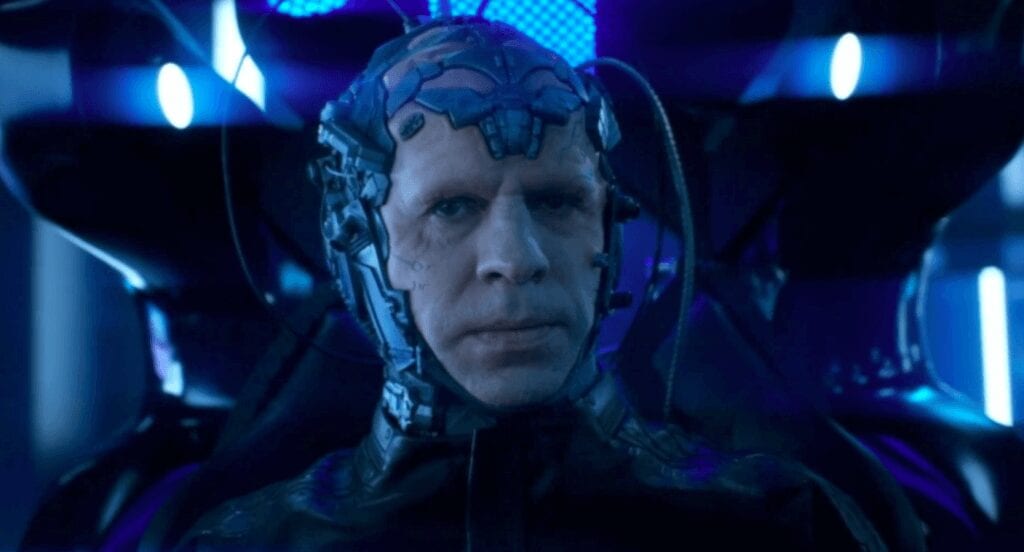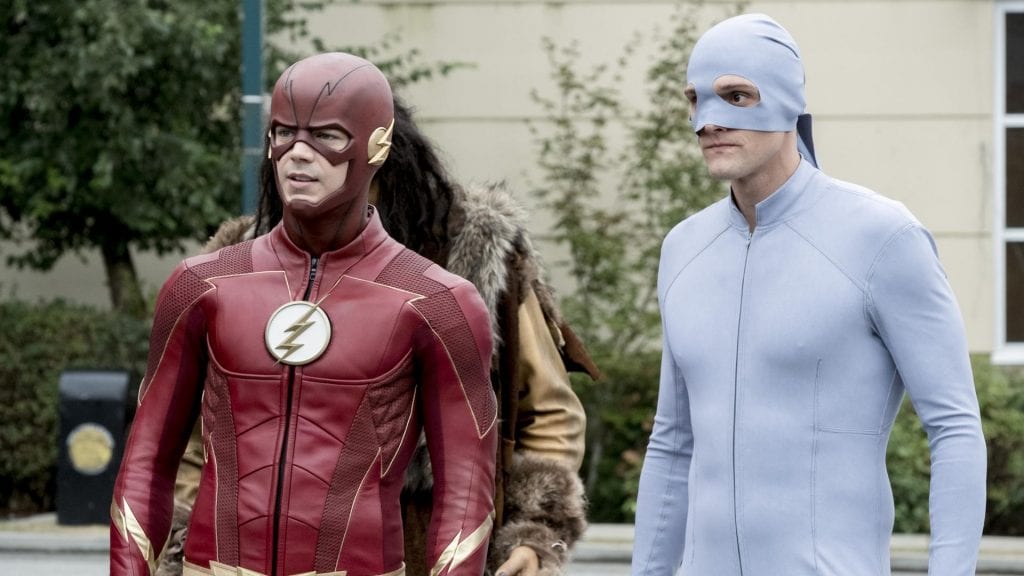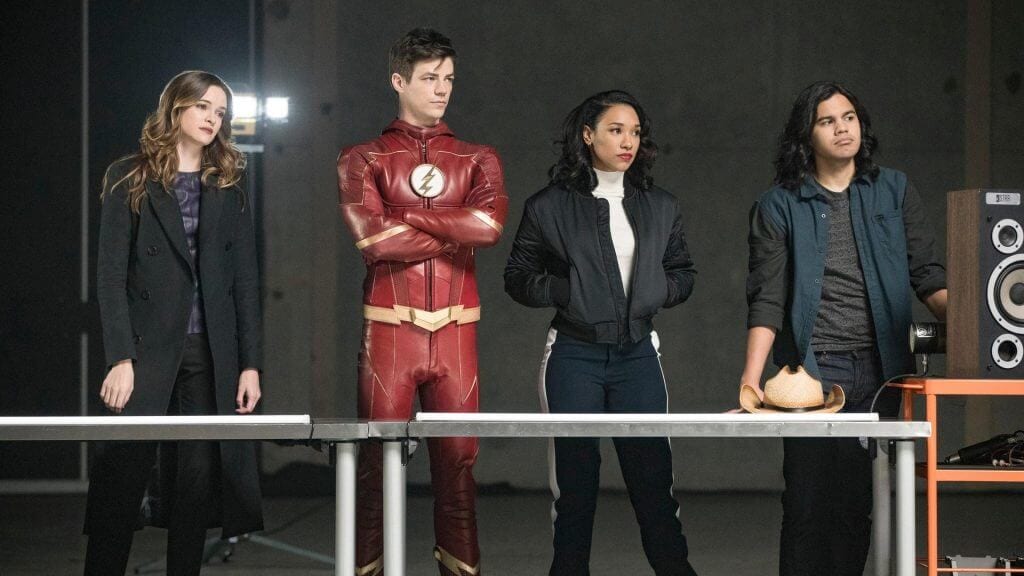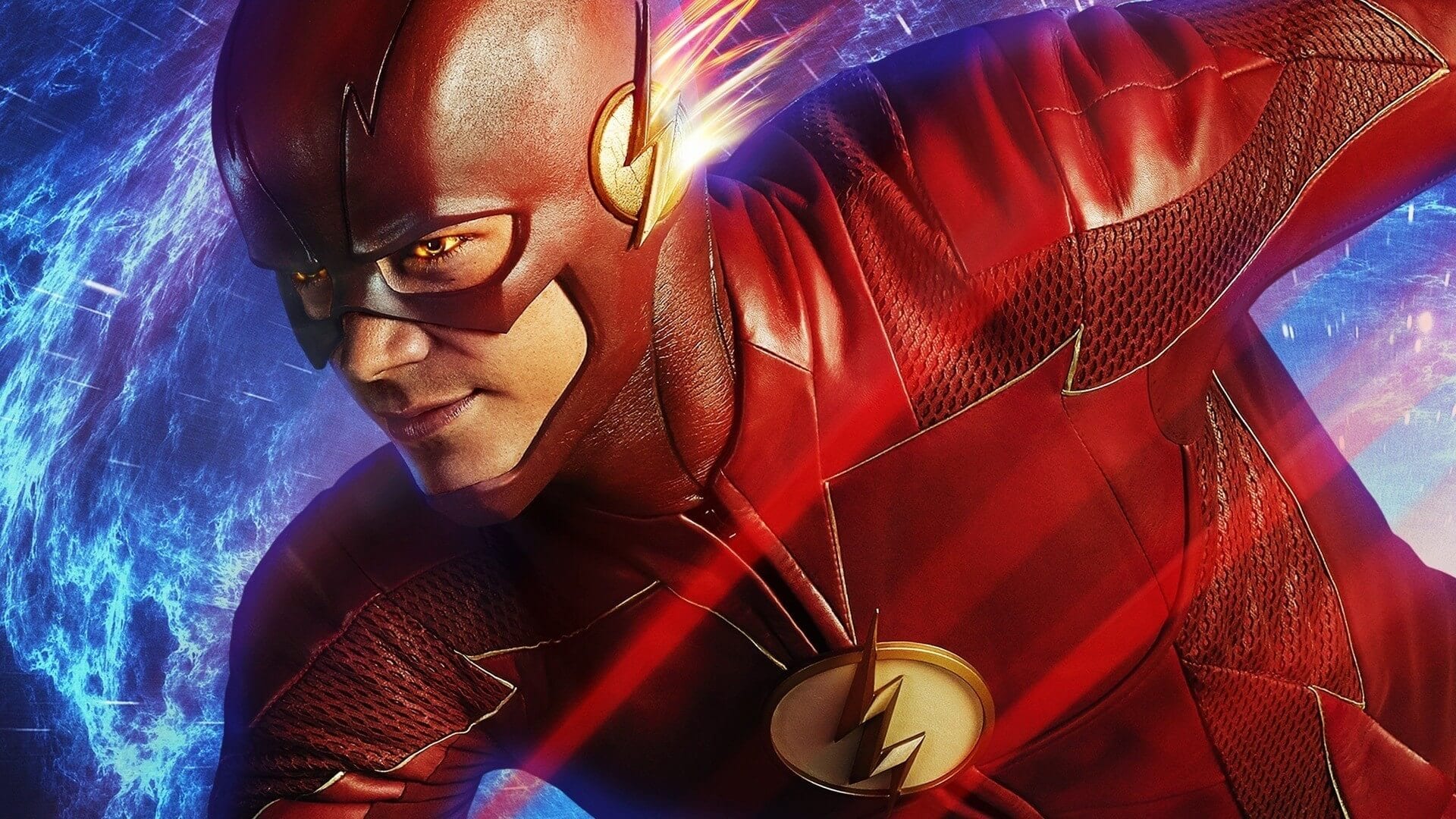REVIEW: The Flash Season 4 (2017-2018)
The Flash season 4 all but made me lose interest in what was once one of my favorite shows. I didn’t dislike it; there’s still plenty about the premier superhero series currently airing that I love, and unlike Arrow I think there’s more potential to right the ship next season. But in the face of lackluster new characters, a laughable new team dynamic, extremely forced comedy and one bizarre casting choice, the dip in quality is undeniable, even as the show does some things many fans – myself included – have asked for over the past couple of seasons.
*Spoilers*
Much like Arrow, The Flash season 4 begins with a cliffhanger to resolve: Barry Allen has given himself up to the Speed Force, effectively dying to save the world and leaving his friends and family behind to pick up his mission. Wisely, the show brings him back before the halfway point of the season premiere, not taking its audience for idiots who would believe he might be gone for good. This is something The Flash does better than Arrow; while it can get lost in some genre tropes at times, it rarely repeats them over and over. They did the “Barry’s Gone” storyline before; no need to pretend it’ll take this time. Admirably, they don’t cling to Barry having lost his mind in the Speed Force either, returning him to normal by episode’s end. And Barry’s reemergence even ties into the overarching plot, being an element of the main villain’s evil plan. This is great, economical writing, and a strong opening for a season that doesn’t live up to it.
Part of the problem is that villain: Clifford DeVoe, alias the Thinker. One of the bigger criticisms of the series has been its reliance on evil speedsters as the central antagonists; it would be hard enough for subsequent nemeses to live up to season 1’s Reverse-Flash without giving them the same exact powers. The Flash season 4 breaks this cycle with DeVoe. Far from a speedster, DeVoe is actually confined to a wheelchair, an early visual cue that he is an altogether different threat than what Barry has faced so far. As his villainous moniker implies, DeVoe is more a mental challenge for Barry than a physical one, planning for every contingency, seemingly knowing exactly what his enemies will do next and incorporating that into his schemes. He also serves as a foil to a different aspect of Barry’s personality, challenging Barry’s intellect rather than his superpowers – a dark version of Barry Allen, rather than the Flash. Even his goals are similar to Barry’s; DeVoe honestly believes he’s saving people by dumbing down mankind, and his methods and philosophy once again bring up the show’s overarching utilitarianism vs. Deontological ethics theme. Theoretically, he’s the perfect next step for the show’s rogues’ gallery to take.

In practice, however, DeVoe just isn’t nearly as interesting as his predecessors (even the unfairly-maligned Savitar). Most of his screen time consists of him sitting in a floating chair and being condescending. Even his fights are visually dull, as he sits still and fires a laser blast while Barry runs around. Every so often during The Flash season 4, DeVoe will do something truly thrilling, like framing Barry for his murder while he takes over someone else’s body, or letting loose on a whole facility full of soldiers in the penultimate episode’s opening (a riveting sequence that, while much appreciated, is too little, too late), but most of the time he’s either sitting or standing. It makes logical sense and is in keeping with the character; it just doesn’t really work for a whole season, especially when we’re supposed to feel like Barry’s back is against the wall. DeVoe’s wife Marlize fares better, as she accentuates the darkness of DeVoe’s quest for control; he doesn’t even stop with his wife, brainwashing her to keep her on his side, making her a microcosm of how he views humanity as a whole. And she embodies DeVoe’s one weakness: while he’s planned for every practical contingency, he failed to account for emotion, dismissing it as anti-intellectual and, therefore, irrelevant when it’s the most important factor of all. Otherwise, though, Clifford DeVoe – despite an excellent, nuanced performance from Neil Sandilands that marries DeVoe’s arrogance and anger with his dedication to bettering the world and love for his wife – is a letdown.
The Flash season 4 has a secondary villain as well, and she is much, much worse than the merely disappointing DeVoe. Amunet Black, a metahuman gangster for whom Caitlin worked in her Killer Frost guise, becomes something of an X factor, functioning both as a diversion from DeVoe’s plot and an occasional piece of it. Amunet has a bucket containing small pieces of metal that she can control, using them as projectiles or forming a glove with which to pound her enemies. She’s a more physical opponent than Devoe, which makes for a nice change of pace when the action starts. Again, the problem is in the execution; Amunet is a terrible character, played broadly and for laughs by Katee Sackhoff and never feeling like a legitimate threat. Sackhoff gives Amunet a thick – and phony-sounding – English accent that is so bad it’s impossible to take anything she says seriously. Why didn’t they just get an English actress? How did anyone involved in the production hear Sackhoff’s voice and think it worked? Amunet is a complete misfire, and she pops up too often to be overlooked.
Falling somewhere in the middle of the major and minor villains is Ralph Dibny, a disgraced former cop and current low-rent private eye who, under Barry’s tutelage, becomes the superhero Elongated Man. As a character, Ralph has the strengths of DeVoe and the weaknesses of Amunet. Like DeVoe, he brings out some of Barry’s better qualities, specifically his inherent goodness and all that he’s learned about being a hero. Barry becomes Ralph’s superhero mentor, but it’s different from his training of Wally because Ralph is much more morally compromised – he’s selfish, egotistical and doesn’t care for rules or a code, but buried deep within is a good man Barry is determined to bring out. As such, Ralph functions as the personification of Barry and DeVoe’s philosophical divergence; DeVoe sees only the worst aspects of people and wants to take their choices away, but Barry sees the best even in a lowlife like Ralph Dibny and won’t give up convincing him to be a better person. The problem with Ralph is similar to that with Amunet (albeit to a mercifully lesser degree): he’s not that funny and often just gets annoying. I understand the character has to be broad, but does he have to be corny? The humor on The Flash has traditionally worked quite well, but almost all of Ralph’s attempts at comedy turn out to be groaners… and they’re non-stop! Hartley Sawyer is a capable actor and succeeds in Ralph’s more emotional moments, but his delivery of the jokes is off, and they’re not particularly great ones to begin with. Ralph is an important part of The Flash season 4, but he’s better seen and not heard.

Most of the main cast is fine in The Flash season 4… just fine. Aside from his conflict with DeVoe and his molding Ralph into a hero, Barry is learning how to be married, and that he has to consider Iris when making huge, Flash-size decisions now. This had potential, but is handled poorly, and it makes Iris look petty and childish. She’s mad at Barry for going into the Speed Force and abandoning her. Well, what was the alternative? Letting the world be destroyed? This leads to her constant “We’re the Flash” mantra, as well as the fact that she’s now somehow the leader of the team and everyone is okay with this. Aside from the title of the show being The Flash, you have to marvel at the ludicrousness of three scientists, a veteran detective and a superhero (two if you count Wally, who’s now departed for Legends of Tomorrow, God help him) taking orders from a blogger. And her leadership mostly consists of waiting for the people who know what they’re doing to have an idea, then saying, “Go do that,” as if it were hers. The awful episode “Girls Night Out” sheds some light on what the real thought process was here, as Iris, Caitlin, Cecile and special guest Felicity go on an adventure while the guys become drunken idiots and talk about how terrible men are; The Flash is apparently going to have a healthy dose of feminism, regardless of what it does to the show or characters. Iris and the other women constantly chanting “Hashtag Feminism!” is the apex of this ham-handed theme; none of these ladies, as previously presented, would ever say that, but the writers and producers have a point to make and they won’t let something as inconsequential as character consistency get in their way. The worst part is that this episode didn’t have to be bad. Having the girls go off to fight a villain while Barry and the boys are indisposed is a neat idea, and Barry getting drunk and announcing to a whole (thankfully disbelieving) strip club that he’s the Flash is funny; it’s the constant blaring of the “man bad, woman good” horn that kills any potential fun and lets us know this is a lecture. The “Crisis on Earth-X” crossover did it for the anti-Trump sentiments of the showrunners, and now the entire season of a formerly fun and universally appealing superhero show is doing it for feminism. There’s more of this elsewhere in the season, as Barry forgets everything he’s learned over the years and devolves into a hot-headed dope who needs to listen to Iris to tie his shoes. Much like Han forgetting how to fly his own ship, the hero of the show is being made a fool of to accentuate someone else. While Grant Gustin and Candice Patton do their best, Barry and Iris aren’t nearly as interesting this year.
The supporting cast mostly follows suit. Caitlin actually fares the best in The Flash season 4 (if they really wanted a woman leading the team, why not her?), as she’s further torn between her own personality and that of Killer Frost. Her trajectory is similar to Bruce Banner’s in the MCU, as she tries to find a way to use her violent alter ego for good, merging their identities as much as she can. The reveal that Killer Frost has always been a part of her opens up a fascinating new door for next season. Cisco, unfortunately, is mostly relegated to navigating his relationship with Gypsy. I like the idea of putting a superhero spin on a long-term relationship, and while the conclusion is a downer (I really liked Gypsy), it’s a good way to contrast it with Barry and Iris, showing that not everyone gets the fairy tale ending; still, though, it’s just him fretting over whether he forgot an anniversary and such. His friendship with Harry also reemerges, but for the bulk of the season they’re just bickering with each other, and their banter doesn’t have the bite it did in season 2. And speaking of Earth-2’s Dr. Wells, the arc where he loses his intelligence is good and shows how DeVoe’s plan will take people’s humanity away from them. The Council of Wells, on the other hand, doesn’t work and turns what was once a nuanced piece of acting from Tom Cavanagh into a broad joke. Joe and Cecile’s pregnancy is dull, and her developing psychic powers is a missed opportunity to explore the ethics and ramifications of using them; not once does anyone ask if it’s okay for her to read minds without permission, and on a show that is built largely on moral dilemmas.

There are some bright spots to The Flash season 4, though. The look of the show is quite good, with DeVoe’s lair a chromatically cold counterpart to STAR Labs and its friendlier vibe; Iron Heights prison also successfully sets the foreboding mood while Barry is stuck behind bars. There aren’t many filler episodes, with even the lesser ones furthering the plot in some way. “Enter Flashtime” is excellent, but seems like a diversion… until later, when Barry’s new power becomes pivotal to defeating DeVoe. And there are some nice setups for season 5, from Caitlin’s revelation about Killer Frost to the arrival of Barry and Iris’ future daughter, who has undoubtedly brought a lot of trouble with her. Even Reverse-Flash teased that he will return in the crossover, and any appearance from the Arrowverse’s best villain is welcome. Of course, Amunet is still out there somewhere, but maybe she’ll stay gone. Probably not, but we can hope, can’t we?
But The Flash can get better. If it drops the broad politics, gets more compelling villains and gives its main characters some meatier subplots, it can be a fun, exciting and thought-provoking superhero show again. The politics are almost certainly here to stay, which is a drag, but there is potential for the others. I hope it does get better, because a mixed bag like The Flash season 4 is unworthy of this series.
The Flash Season 4
Plot - 7.1
Acting - 5.8
Progression - 8.8
Production Design - 7.9
Action - 4.8
6.9
Okay
The Flash season 4 all but made me lose interest in what was once one of my favorite shows. I didn’t dislike it; there’s still plenty about the premier superhero series currently airing that I love, and unlike Arrow I think there’s more potential to right the ship next season. But in the face of lackluster new characters, a laughable new team dynamic, extremely forced comedy and one bizarre casting choice, the dip in quality is undeniable, even as the show does some things many fans – myself included – have asked for over the past couple of seasons.







